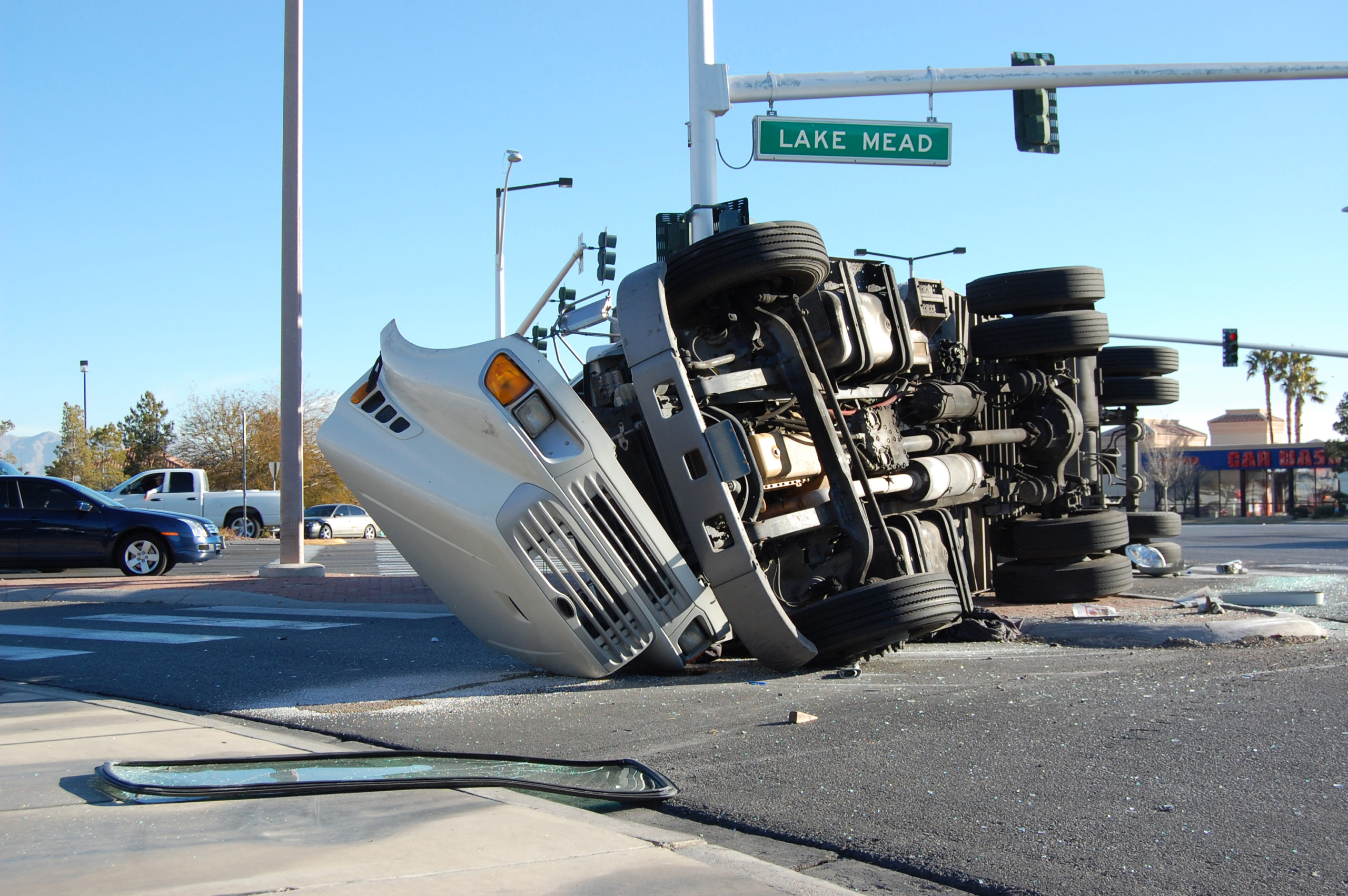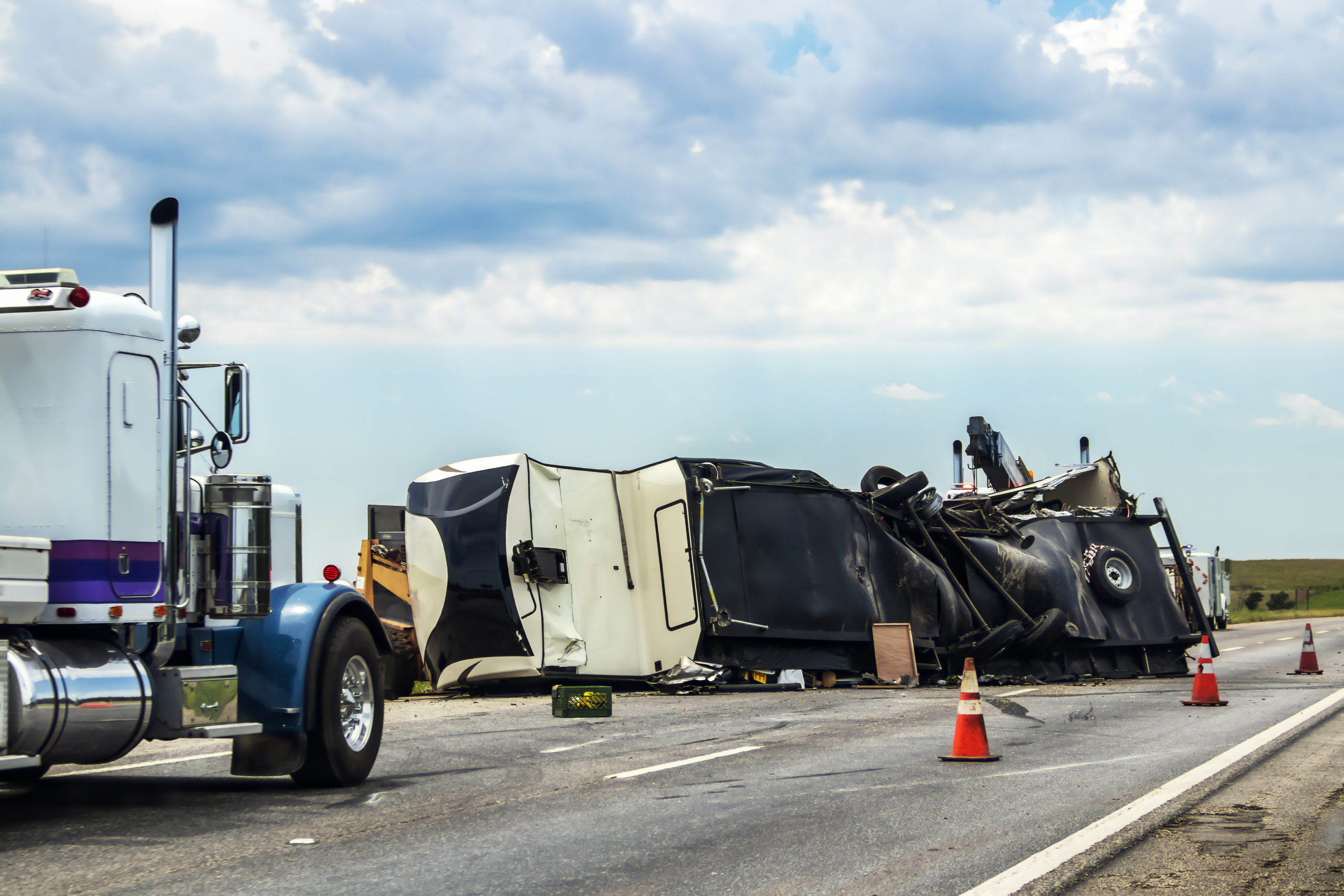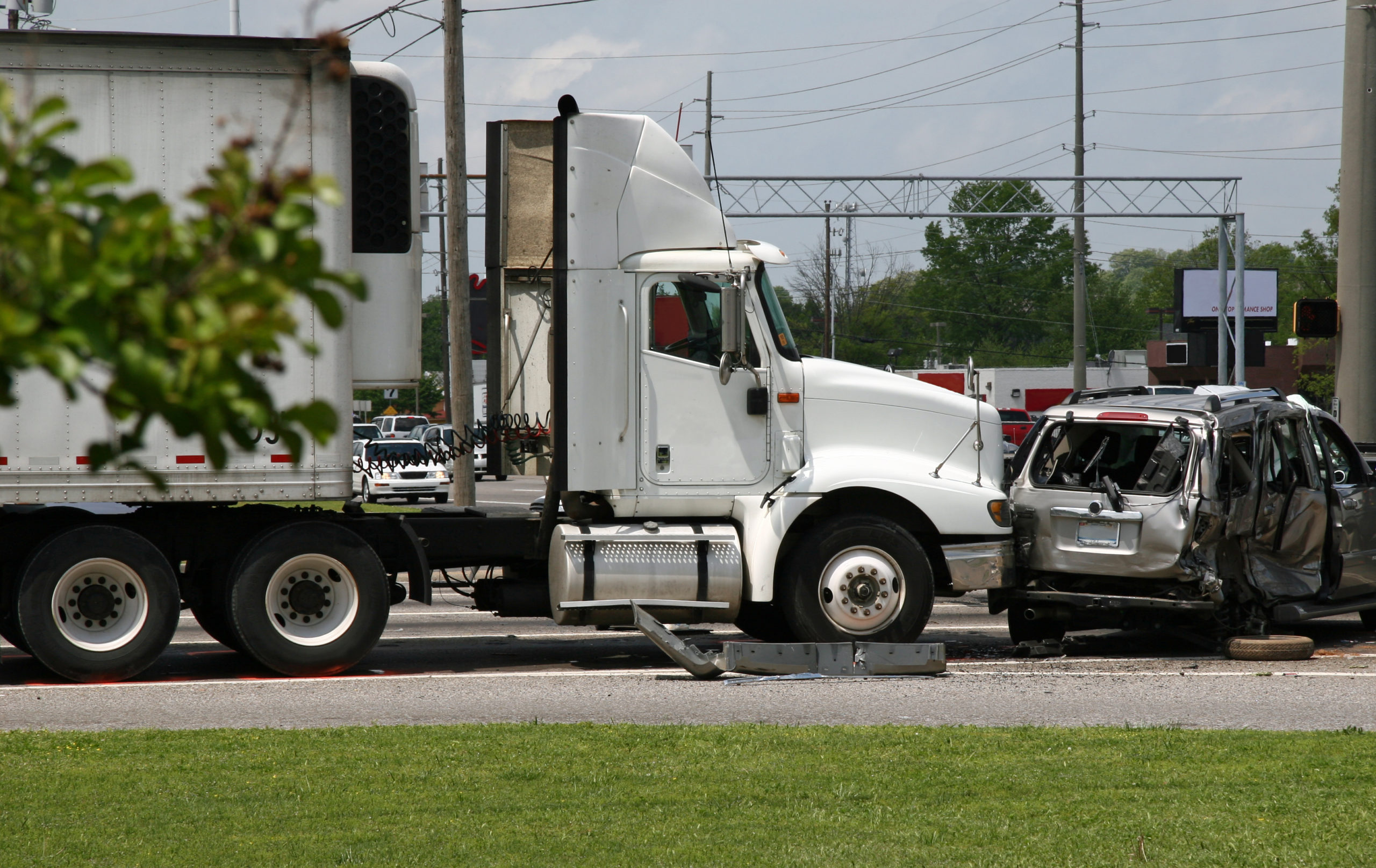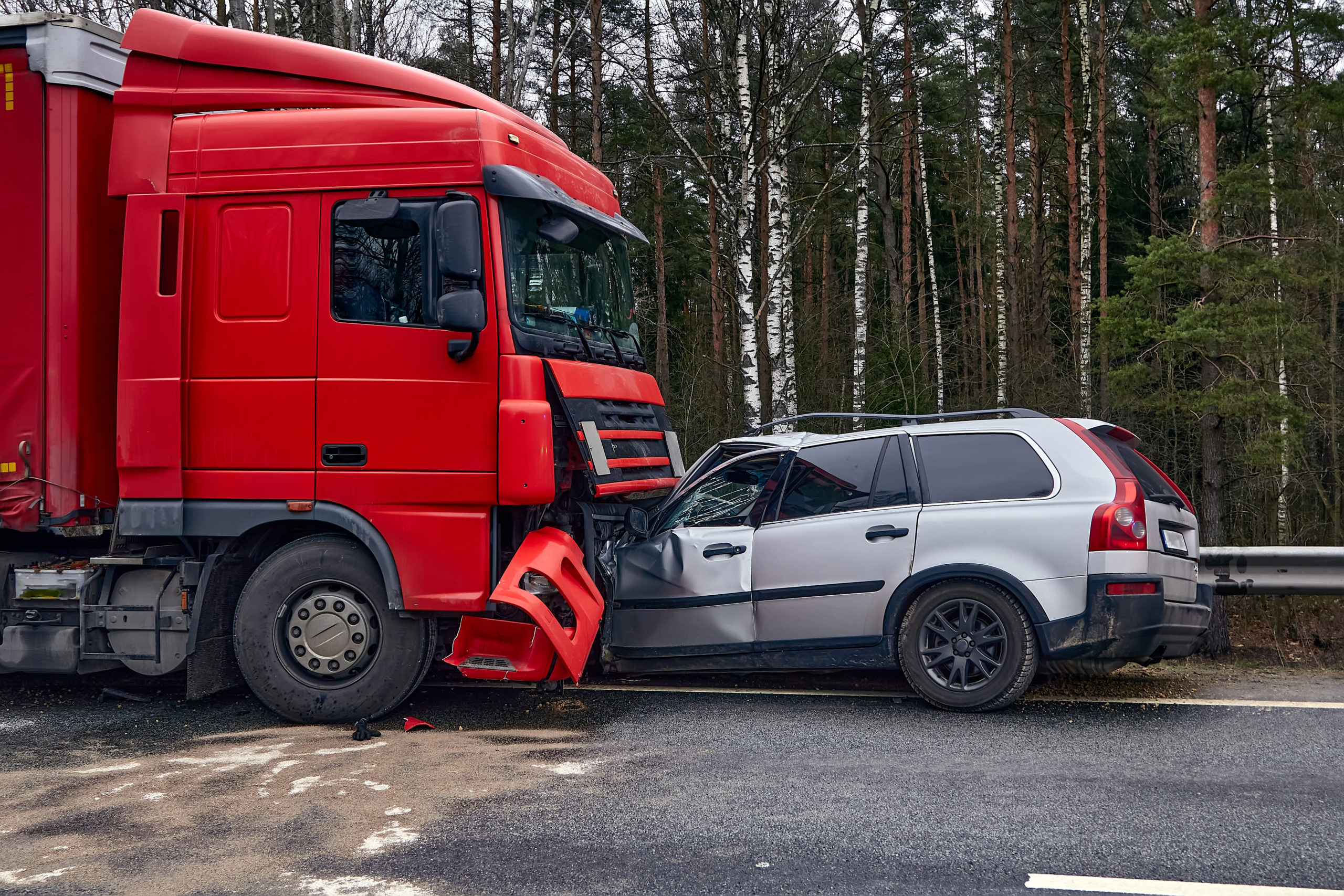
New Jersey Truck Accidents Lawyer
Any kind of auto accident can be devastating — physically, financially, and emotionally. But when a commercial truck or other large vehicle is involved, the results are often even more catastrophic. After all, trucks typically weigh 20-30 times as much as a passenger car. Even a large SUV is no match for a commercial truck when both are in an accident.
If you’ve been injured by a commercial truck, it’s important to know your rights. This guide will help you understand how truck accidents happen, how to pursue compensation, and what to expect during the legal process in New Jersey. For purposes of this guide, a commercial truck may include:
- Tractor trailers
- Tanker trucks
- Flatbed trucks
- Garbage or dump trucks
- Tow trucks
- Construction vehicles
- Delivery trucks
Bus accidents can also share similar characteristics due to their size, weight, and design.
Victims of any kind of auto accident should seek legal help as soon as possible, but this is especially true for a truck accident. Truck accident cases don’t just require legal expertise — but also special knowledge of the trucking industry and the insurance system. An experienced truck accident attorney will be able to navigate these issues and give you the greatest chance of securing fair compensation for your losses.
Truck accidents and personal injury overview
The law recognizes the potential danger of commercial trucks. That’s why the trucking industry is highly regulated. Both the New Jersey Department of Transportation and the Federal Motor Carrier Safety Administration (“FMCSA”) require commercial trucks to follow detailed laws, rules, and regulations. Individual municipalities may also have additional laws and regulations that commercial trucks must follow.
For example, under FMCSA regulations, truck drivers carrying property generally may not drive more than 11 hours in a shift after taking at least 10 consecutive hours off duty. They also have to take a 30-minute break when they have driven for 8 cumulative hours. In addition, truck drivers must keep an accurate logbook of their time, including all hours driven and their breaks. The trucking industry is subject to many other legal requirements, including with respect to:
- Maintaining trucks
- Correctly loading cargo
- Transporting hazardous materials
- Transporting oversized loads
- Ensuring drivers refrain from alcohol or substance abuse
Despite all of these rules, hundreds of thousands of truck accidents still happen every year, resulting in thousands of injuries and even death. Truck accidents happen for many reasons. Sometimes, they can’t be avoided. But more often, truck accidents are due to human error, such as:
- distracted driving (talking on a cell phone, texting, eating, etc.),
- speeding or breaking other traffic laws,
- falling asleep at the wheel,
- improper maintenance,
- improper loading, or
- driving under the influence.
(See Common Causes of Truck Accidents).
If you were injured in a truck accident, you should know that New Jersey is a “no fault” auto insurance state. This means that all New Jersey drivers must carry personal injury protection, or PIP, insurance. That PIP coverage will pay for your truck accident medical costs up to your policy’s limits. This is true regardless of who caused the accident. Depending on your policy, PIP coverage may also compensate you for certain other economic losses, such as lost wages.
Unfortunately, the consequences of truck accidents are usually severe. Medical expenses are often much higher than PIP policy limits, which can be as low as $15,000. If this is true for you, you may be able to pursue additional compensation for your economic-losses from the at-fault party (or their insurance company). You can also sue for pain and suffering or other non-economic losses.
Note that in most other types of auto accidents, you can only sue for pain and suffering if you’ve sustained qualifying injuries (such as disfigurement or displaced fractures) or your policy includes an unlimited right to sue. But this limitation does not apply to truck accidents. In other words, you can sue an at-fault truck driver (and/or another at-fault party) for pain and suffering, no matter how severe your injuries are.
You can sue an at-fault truck driver (and/or another at-fault party) for pain and suffering, no matter how severe your injuries are.
The best way to identify all potential sources of compensation is to consult with an experienced New Jersey truck accident lawyer. A lawyer can also help you negotiate with your own insurance company. Insurance companies handle auto accident claims regularly, and their claims adjusters are skilled negotiators. Even if your accident was severe, you may find it difficult getting fair compensation without the help of a lawyer.
See Getting Compensation From Your Insurance and Getting Compensation From an At-fault Party for more information about seeking compensation.

Case Study: $3.9 million
What makes this case unique: Competing arguments on whether the victim had experienced “impending doom”; a big-shot attorney who was “too large” for the case.
What to do if you’ve been in a truck accident
The aftermath of an accident can be stressful and chaotic. But you should still try to take the actions outlined below as soon as possible. These steps will help protect your rights and preserve your ability to get full and fair compensation.
Consulting a lawyer is important no matter who you think was at fault.
Common mistakes to avoid
In addition to the steps above that you should take, there are several things you should not do after a truck accident. These actions can seriously harm your case and your ability to get full compensation. Below are a few examples of common mistakes.
Admitting fault
You should never admit fault to the truck driver, trucking company, police, insurance companies, or anyone else. Sometimes trucking company representatives even come to the scene of the accident and try to get you to admit fault. Even saying you’re sorry can be interpreted as an admission of guilt — so it’s best to say as little as possible.
Even if you think an accident is your fault, that might not be legally accurate. It’s often difficult to determine the cause of an accident without a full investigation. There may be factors that contributed to the accident that you’re not aware of. In any case, you are not responsible for determining fault, even if you think you caused the accident.
Minimizing your fault is important because New Jersey is a modified comparative negligence state. That means that if you’re found at least partially at fault in a lawsuit, your damages will be reduced by the percentage of your fault. If you’re more than 50% at fault, you may not receive any damages at all. Insurance companies also look at this rule when evaluating third-party claims. (See Getting Compensation From an At-fault Party — The “modified comparative negligence” rule.)
This is one of the many reasons you should get the help of a personal injury attorney. Your attorney will collect and evaluate evidence and ensure that fault is properly assigned in your case.
Giving too much information to the insurance companies
If you’re in an accident, your auto insurance policy likely requires you to notify your insurance company and give them basic details about the accident. But until you’ve consulted with an attorney, you should only give the facts required by your policy.
You also shouldn’t sign any settlement offers, medical release forms, or other documents from the insurance companies. Signing certain paperwork could hurt your right to pursue full compensation. Medical release forms may also give the insurance company access to your entire medical history, and they may use previous injuries or conditions as an excuse to reduce or deny your claim.
Also keep in mind that if the trucking company or another party’s insurance company tries to contact you, you do not have any obligation to provide any information about the accident. In fact, it’s best not to talk to them at all. Instead, take down the insurance company’s information and contact an attorney right away.
Waiting too long to act
If you’ve been in an accident, it’s important to act as soon as possible. The longer you wait, the harder it will become to collect strong evidence that will help you get the compensation you need.
There’s also a deadline for filing a personal injury lawsuit under a law called the statute of limitations. New Jersey’s statute of limitations generally gives auto accident victims two years from the date of the accident to start a lawsuit.
Two years might seem like a lot of time, but negotiating with the insurance companies may take longer than you expect. To make sure you have plenty of time to negotiate and file a lawsuit if necessary, you should contact an attorney as soon as possible after your accident.
Talking about your accident on social media
Insurance companies sometimes spy on social media accounts, looking for evidence they can use to reduce or deny your claim. This may even be true for your own insurance company. If you’ve been in an accident, you’ll have to be very careful about what you post on social media. In fact, it’s best not to post anything at all until you’ve resolved your case.
While this may seem extreme, posting photos related to the accident or updates about your recovery may be used against you. And even seemingly unrelated posts, such as photos of you on a trip or enjoying a hobby can make it seem like you’re “fine” even if you’re not. If you need to give updates to your friends and family about how you’re doing, it’s best to do it privately.
Agreeing to a settlement too soon
When you’re dealing with injuries and mounting medical bills, it may be tempting to accept a quick settlement. But as noted above, the trucking company and insurance companies want to protect their own financial interests and pay out as little as possible. That means early settlement offers are usually much lower than you actually deserve.
Once you accept a settlement, you give up your right to pursue the claim any further. To make sure you get full and fair compensation, you should speak to a personal injury attorney before accepting any offer.

Finding an Attorney for Your Case
Consulting an attorney is one of the most important steps you should take after an auto accident. Some people mistakenly believe that they can handle a case on their own through their auto insurance. But even your own insurance company will usually be more concerned with protecting their bottom line than giving you full and fair compensation. As a result, you can’t rely on them to advise you, explain your rights, or do what’s best for you.
When a commercial truck is involved, it’s even more critical to choose the right attorney. Commercial policies are very valuable, so insurance adjusters working on these cases are usually highly skilled negotiators. Trucking and other commercial vehicle companies also typically have experienced and aggressive investigators and attorneys on their side.
Hiring a qualified trucking accident lawyer will help even the playing field. Your attorney will:
- help you understand your rights;
- evaluate your case and identify all legally responsible parties;
- establish the potential value of your claim;
- handle all accident-related communications and negotiations with third parties;
- gather evidence, such as trucking company records, safety logs, and medical records;
- engage appropriate experts to support your case, such as accident reconstructionists and medical experts; and
- navigate complicated court procedures and legal requirements.
What to bring to a legal consultation
When meeting with a potential attorney, you should bring any evidence you have with you. This may include:
- medical records (bills, diagnoses, MRI/CT/test results, etc.)
- photos or videos of the accident scene, the vehicles, and/or your injuries
- any contact information you have for the trucker, the trucking company, their insurer, and any witnesses
- the police report
- your own written account of what happened before, during, and after the accident
- any other relevant information or documents
All of this will help the lawyer better understand what happened. If your attorney believes they can help you and you decide to work together, they’ll proceed with a more thorough investigation.
The sooner you start the process, the better. A proper investigation and building a case can take some time. There are also strict deadlines for filing insurance claims and lawsuits. If you miss these deadlines, you may no longer have the right to pursue any compensation.
What to look for in an attorney
Your attorney can have a big impact on the success of your case, so you should choose one carefully. Here are a few things to look for when hiring a truck accident lawyer:
When choosing a lawyer, you should be wary of any attorney who claims they can get you money fast. While getting compensation quickly sounds great, especially if you’re facing medical bills or you’re unable to work, this may not be in your best interest.
A lawyer who says they can resolve a case quickly does not necessarily mean that the lawyer is good. And a case taking several years, like many personal injury cases do, doesn’t mean that the attorney is bad. In fact, the best way to ensure maximum compensation is to thoroughly prepare and negotiate a case.
Unfortunately, there are many law firms who are more interested in quick payouts than getting maximum compensation. Instead of aggressively advocating on your behalf, they quickly resolve cases for smaller amounts. The smaller amounts are acceptable to these law firms because they can make up the fees by taking on a larger volume of cases. But that only benefits them, and not you, as the client. If you come across a law firm that settles a lot of cases quickly, you should consider it a red flag.
Looking for the best truck accident lawyer in New Jersey?
At Rosenblum Law, we understand the devastating effects a truck accident can have on your life. We’ll thoroughly evaluate your situation and determine the best course of action for your particular circumstances. If we’re able to take on your case, we’ll guide you through the legal process and fight on your behalf for maximum compensation.
We also provide guidance for those looking for help selecting the best law firm for their case. We have a large network with dozens of law firms that we have pre-screened to ensure that you will get the best law firm for your specific case.
For a free consultation, call us today at 888-235-9021 or contact us through our website at www.rosenblumlaw.com/contact. We’re passionate about helping all our clients get the compensation they’re owed — and we won’t take a fee unless we win a settlement or verdict for you.

Common Causes of Truck Accidents
Whether you can pursue a claim against the truck driver, the trucking company, or another third party will depend on the cause of the accident. But truck accidents can happen for a variety of reasons — and it’s usually not easy to determine the exact cause without a thorough investigation. Some causes may not be readily apparent to you. There may also be more than one cause.
Below are some common causes of truck accidents. But to figure out what happened, it’s best to get the help of an experienced truck accident attorney. A good attorney will know what to look for and explore all possibilities. They’ll also engage the appropriate experts, such as accident reconstructionists, so make sure they have a complete understanding of what happened and how.
Driver Error
Driver error is a major cause of auto accidents. Truck accidents are no exception. According to the Federal Motor Carrier Safety Administration (“FMCSA”), in 2018 at least one driver-related error was recorded for 32% of fatal truck accidents. Speeding was the leading cause in these accidents.
Other examples of truck driver errors include:
- Failure to yield
- Unsafe lane changes
- Tailgating
- Sharp turns
- Failure to use signals
- Other traffic violations
While most commercial vehicle drivers are skilled at handling such large and complex vehicles, when they do make mistakes, they should be held accountable. If a trucking company failed to properly hire, train, or supervise a driver, they may also be held legally responsible. An employer trucking company could also be held responsible for the negligent acts of an employee truck driver under the legal doctrine of respondeat superior. (See Getting Compensation From an At-fault Party — Identifying responsible parties.)
Driver errors happen for many reasons. Below are a few factors that may contribute to a trucker’s ability to drive safely.
Overloading or improper loading
Properly loading a truck is important to the safety of everyone on the road. There are generally three types of loading errors that may contribute to truck accidents:
Mechanical / equipment failures
All vehicles should be regularly inspected and maintained for safety reasons. But trucks in particular are subject to a lot of wear and tear due to long periods on the road in all kinds of conditions. Under federal regulations, the owners of commercial trucks must strictly follow a maintenance schedule and keep records of such maintenance.
But maintenance and repair means that a truck will be taken out of service — and the owner can’t use it to make money. Unfortunately, some trucking companies fail to properly maintain their trucks so they can continue making a profit. Or they may rush through maintenance, resulting in inadequate repairs. Drivers may also ignore issues they notice because of the pressure to keep on schedule and make deliveries as fast as possible.
Failure to inspect, maintain, or repair a truck can lead to issues like tire blowouts, inadequate lights, faulty brakes, and other equipment failures — all of which may cause accidents. Sometimes, truck parts may also be inherently faulty due to design or manufacturing problems. In these cases, the designer or manufacturer may be found at fault for any accidents resulting from these flaws.
Weather or road conditions
In bad weather, slippery roads or poor visibility cause a lot more accidents. And even on a nice day, the glaring sun may make it difficult to see. Damaged roads, construction, and other poor road conditions can also cause accidents.
In these situations, it might seem like no one is at fault — after all, no one can control the weather. But when a driver chooses to drive when it’s not safe to do so, they may still be at fault. They may also be found at fault if they don’t drive in a way that’s appropriate for the conditions. Examples of negligent driving in poor weather may include:
- Driving at unsafe speeds for the conditions — even if they’re under the speed limit
- Following another vehicle too closely
- Failing to use headlights when visibility is poor
- Driving a vehicle that isn’t properly maintained (e.g., with worn tires or broken tail lights)

Common Types of Collisions & Injuries
Truck accidents can play out in many different ways. But due to the size, weight, and design of commercial trucks, when they hit another vehicle, the consequences are often serious. And passengers in the smaller vehicle usually sustain the most severe injuries.
According to the FMCSA, 4,415 fatal crashes involved large trucks in 2018. Each of these crashes resulted in, on average, 1.12 fatalities — and in 82% of these cases, the fatalities were not the occupants of the large truck. There were also 107,000 additional truck crashes in 2018 that resulted in injury.
Below are a few common types of truck collisions and injuries. For the best chances of full and fair compensation, you should get the help of a lawyer who’s familiar with different types of truck accidents and common injuries. Understanding exactly how the accident happened and the full extent of your injuries are both crucial to a successful claim.
Common types of truck accidents
A few common types of truck accidents include:
Common truck accident injuries
Regardless of the type of collision, truck accidents have a higher risk of catastrophic injury and death compared to other auto accidents. For example, the 32 tractor-trailer crashes recorded in 2018 by the New Jersey State Police resulted in 35 fatalities. But even if you feel fine immediately after a truck accident, some injuries can take days or even weeks to become apparent. So it’s important to pay close attention to how you feel in the aftermath of an accident. If you feel pain or anything else unusual, you should get medical attention right away.
Some common truck accident injuries include:
- Head and brain trauma
- Neck and back injuries
- Spinal cord injuries (including paralysis)
- Broken bones
- Burns
- Lacerations and cuts
- Loss of hearing, speech, or sight
- Organ damage
- Loss of limbs
Many of these injuries require significant medical treatment. You may need to spend time in the hospital or get surgery, rehabilitation, or physical therapy. Or you may experience permanent disfigurement, disability, or lifelong pain. You also may not be able to work, take care of your family, or perform your usual daily activities. In other words, your expenses and losses from injuries can add up quickly, and it’s not easy to calculate the full financial impact.
To properly evaluate your losses and seek the right amount of compensation, it’s important to work with an experienced truck accident lawyer. A good attorney will engage the right medical experts to get a better understanding of your injuries and their immediate and long-term effects.

Getting Compensation Through Your Insurance
If you’re injured in any kind of auto accident in New Jersey, your first stop for compensation should be your own auto insurance company. This is also true for truck accidents. The amount of compensation you’ll receive from your insurer will depend on your personal injury protection, or PIP, coverage.
Below is a summary of what you should know when pursuing compensation from your own insurance company.
“No fault” insurance
As discussed in the introduction, New Jersey is one of a handful of states with a “no fault” auto insurance system. By law, all drivers in the state must have auto insurance with a minimum amount of PIP coverage (also known as “no fault” insurance).
If you or someone else covered by your policy is injured in an auto accident, your own auto insurance company will generally pay for your medical bills up to the policy limit — regardless of who caused the accident. Depending on the details of your policy, the following types of compensation may also be available:
If your economic losses exceed your policy’s limits, you may be able to pursue additional compensation from the at-fault party. (See Getting Compensation From an At-fault Party.)
The right to sue for pain and suffering
In most auto accidents, New Jersey’s insurance laws generally only allow lawsuits for non-economic losses like pain and suffering if:
- you sustain certain serious qualifying injuries, or
- you bought an auto insurance policy that includes an unlimited right to sue.
But these limits do not apply in an accident involving a commercial truck. If a commercial truck caused your injuries, you can sue for pain and suffering, regardless of how temporary or minor your injuries may be. (See Getting Compensation From an At-fault Party.)
Negotiating with insurance companies
Your insurance policy is supposed to protect you when bad things happen. Sadly, many insurance companies care more about protecting their bottom lines than helping victims. Even when a claim is legitimate, they’ll aim to pay as little as they can without going to court.
That means you can’t rely on insurance companies — even your own — to consider your best interests, provide advice, or offer fair compensation for your losses. Insurance adjusters also deal with auto accident claims on a regular basis. They’re experienced and skilled at digging for details and information that could damage your claim and allow them to pay less. This gives them an advantage against you in negotiations.
To level the playing field, it’s best to have a lawyer to communicate with the insurance company on your behalf. An experienced attorney will be able to make sure that the insurance company handles your claim the right way. You should not give any detailed statements, sign a release for your medical records, or accept any offers until you’ve consulted your lawyer. If your attorney can’t reach a fair settlement with the insurer, they’ll also be able to file a lawsuit for you.

Getting Compensation from an At-fault Party
Truck accident victims often end up with expenses that far exceed the limits of their PIP coverage. In this case, you may be able to pursue additional compensation from the at-fault party, such as the truck driver or their employer (or their insurance companies). Under federal regulations, commercial trucks are required to have much greater liability coverage than a passenger vehicle. The minimum required insurance coverage for a large truck is $750,000.
You can also pursue a lawsuit for non-economic losses, such as pain and suffering, regardless of what kind of insurance policy you have. Below is a summary of what you need to know when considering a claim against an at-fault party.
Statute of limitations
One of the most important things to know about pursuing a claim is that there’s a deadline for filing a lawsuit. The law that sets this deadline is called the statute of limitations. Under New Jersey’s statute of limitations, you generally only have up to two years from the date of an auto accident to file a personal injury lawsuit.
While this may seem like plenty of time, negotiating with insurance companies to get compensation may take longer than you think. The trucking company may even try to drag this process out.
To make sure you have enough time to file a lawsuit if needed, you should consult with an attorney as soon as possible after your accident. This is especially important if a New Jersey government employee or agency vehicle is involved. To sue a government entity, a notice of intent to file a claim must be filed within 90 days of your accident.
Once the statute of limitations has lapsed, you’ll likely no longer be able to file a lawsuit. However, there are limited exceptions, so it may still be worth it to consult with an attorney.
Valuing a truck accident case
Valuing a case isn’t an exact science. The amount of compensation you’re able to receive will depend on your specific injuries and the impact they’ve had on your life. But to properly value your case, you’ll generally have to wait until you’ve reached “maximum medical improvement.” This means you’ll have to recover completely, or as fully as you’re likely to.
Some injuries will have long-term or lifelong effects, such as pain, disfigurement, or disability. Some injuries may also require ongoing treatment to provide temporary relief or prevent further problems. You can only assign an appropriate value to your case if you can establish the costs of all past and any expected future treatment, as well as the effects the injuries will have on your life. Your attorney, with the help of medical experts, will estimate the appropriate amount to seek in your case.
During settlement negotiations, your attorney will advise you on whether a settlement offer is a fair reflection of your case’s value. If your case goes to trial, the judge or jury will decide how much to award based on the evidence and testimony. Your damages can fall into three categories:
Identifying responsible parties
Truck accidents are often complex because many parties other than the truck driver may be involved. For example, under a legal doctrine called respondeat superior, an employer may be held legally responsible for the negligent acts of an employee committed within the scope of the employee’s job responsibilities. This means it may be possible to pursue compensation from a trucker’s employer.
Depending on what caused an accident, other potential defendants could include:
- The owner of the truck
- The loading facility
- The owner of the truck’s cargo
- The manufacturer of the truck or its parts
- The designer of the truck or its parts
- The mechanic responsible for maintenance of the truck
In the case of McGarvey v. G.I. Joe Septic Service, Inc., for example, a defendant bought an unfinished truck from a dealer and drove it at night to a secondary manufacturer for customization. The truck didn’t have sidelights or reflectors. When the truck driver made a u-turn, the plaintiff crashed into the truck. The plaintiff was unable to see it in time due to the lack of sidelights on the truck.
The Superior Court of the Appellate Division held that the truck was defective because it didn’t have standard safety features for night driving. The court also held that, in addition to the truck driver, the manufacturer could be held liable for selling a truck that could foreseeably be driven without basic safety features. The dealer could also be liable for selling a truck lacking safety features to a customer who the dealer knew would be driving without such features. In other words, the plaintiff was able to sue not just the truck driver, but also the dealership and the manufacturer.
Different damages may also be covered by different parties and their respective insurers. Identifying responsible parties will likely require some industry knowledge and investigation. It isn’t easy to do on your own. This is yet another reason it’s best to get the help of a personal injury attorney familiar with truck accidents and the trucking industry.
Elements of personal injury claim
To win a truck accident lawsuit, you have to prove four things, called the “elements” of your claim:
Building a truck accident case
For the best chances of securing compensation, you and your attorney will need to gather as much evidence as possible. Below is an overview of the evidence that may play a role in your case.
You’ll need the help of a truck accident attorney to get much of this evidence, and it’s important to move quickly. Under federal regulations, certain records are only required to be maintained for a limited time. For example, a driver’s record of duty status and supporting documents must be kept for only six months. Other evidence, such as photos of injuries, vehicle damage, and road conditions, is best collected immediately after an accident. If you wait too long, critical evidence may already be lost.
Common truck accident evidence
Insurance companies and juries in a lawsuit will consider a variety of factors when determining fault. Evidence in a truck accident case may include:
- Data on the truck’s operation from the truck’s “black box”
- Data from onboard communications systems and GPS systems
- Maintenance and inspection records
- The truck driver’s logbook
- Records on the driver’s qualifications, training, and drug and alcohol screenings
- Load documents, such as bills of lading, weight tickets, dispatch instructions, and delivery documents
- Photos of the accident scene (by the parties involved, police, or witnesses)
- Medical records
- Traffic camera, dash cam, or surveillance footage
- The police report
- Witness statements
- Breath, blood, or urine test results for alcohol or drugs
- Cell phone records (documenting an active call or texting)
The truck’s “black box” may be especially helpful in proving fault. The black box is a device that records data on the truck’s useage and the driver’s habits. It includes information on how long the trucker has been driving and what the driver was doing just before the accident. It can also provide evidence of brake usage, steering changes, and speed. All of this data can make it easier to determine who was negligent in an accident.
The role of experts
Experts are another important part of building a truck accident case. Sometimes the negligence is so obvious that expert testimony isn’t necessary. For example, in Albanese v. Triantos, the drive shaft fell off the bottom of a truck and hit the plaintiff’s car on the highway. The judge ruled that the negligence was so obvious that an expert wasn’t necessary to testify about proper truck maintenance. But in many other cases, attorneys must work with experts to reconstruct the accident and examine parts of the truck so that they can determine exactly what happened and how.
When choosing a lawyer, you should look for someone who has access to highly qualified experts. The defendants will have their own experts testifying on their behalf, and having the right experts on your side can have a big impact on the outcome of your case. The more qualified the expert, the more believable the expert will be to the judge or jury at trial.
The “modified comparative negligence” rule
When pursuing compensation, one thing to keep in mind is that New Jersey follows a modified comparative negligence rule. Under this rule, if you’re found partially at fault for the accident, your damages in a personal injury lawsuit will be reduced by the percentage of your fault, up to 50%. If you’re more than 50% at fault, then you won’t be able to recover any damages.
As an example, if you have $100,000 in medical bills not covered by your PIP insurance and you’re found to be 30% at fault for the accident, then you’ll only get 70% of the $100,000, or $70,000. If you’re found 51% at fault, you won’t recover anything.
This rule is also exemplified in the case Patel v. Patel. Here, the plaintiff was helping the defendant move and the defendant accidentally backed over him with a rented truck. At trial, the jury found the plaintiff was 60% at fault for walking behind the truck when it was backing up and awarded him no damages. The Appellate Division of the Superior Court reversed the verdict, but only because the judge failed to instruct the jury that the defendant had the burden of proving the plaintiff’s negligence. In other words, this case shows that a defendant can escape liability if they can show the plaintiff was more than 50% at fault.
Note that insurance companies also use the modified comparative negligence rule when evaluating third-party claims. This rule is a major reason why you should not admit fault to anyone and get the help of a lawyer to help ensure fault is properly allocated.
The litigation process
If you and your attorney decide to proceed with a lawsuit, below is an overview of what you can expect. While this may seem intimidating, your attorney will handle the entire process on your behalf and guide you every step of the way.
The amount of time it takes to go through the litigation process varies from case to case. It will depend on how complicated your case is, how busy the court is, and how willing the parties are to cooperate and negotiate. In general, however, preparing a truck accident case and going through the entire trial process can take several years.
Suing a Canadian or Mexican carrier
Out-of-state truck drivers are common on New Jersey’s roadways. Sometimes, you’ll even see truckers from Canada and Mexico.
Canadian and Mexican truckers may be allowed into the United States under the North American Free Trade Agreement (NAFTA) for limited purposes. They must be picking up goods for delivery in Canada or Mexico, or delivering goods from Canada or Mexico. They are only allowed to make one or two stops, and generally can’t move goods between destinations within the United States.
If you’ve been injured by a Canadian or Mexican truck, the important thing to know is that foreign truckers are still subject to U.S. and New Jersey laws, rules, and regulations. All drivers, including Canadian and Mexican ones, also must have valid insurance, so there’s a good chance you’ll have a source of compensation.
Still, dealing with a foreign trucker may make your case a little more complicated. If you’ve been injured in an accident involving a foreign carrier, it’s important to have an attorney who is familiar with NAFTA and how it may impact your claim.
Settlements and mediation
Throughout the entire legal process, your attorney will negotiate with the other side to try to resolve the case out of court. Resolving a case out of court is called a “settlement.”
A settlement may be reached through direct negotiations. The parties may also agree to mediation. Mediation is a proceeding where a neutral third-party, called the mediator, helps the plaintiff and defendant reach a settlement. Mediators are often retired judges, attorneys, or other court personnel.
There are no set rules for a mediation. Instead, it’s usually guided by the mediator’s own style and method. The mediator will listen to both sides and make sure everyone gets a chance to tell their story and ask questions. The idea is that this process will help both sides come to an understanding and fair compromise. Of course, sometimes that isn’t possible. If you can’t reach a compromise through mediation, you can still proceed with your case in court.
Both sides to a lawsuit usually prefer to settle, because it helps avoid the lengthy, expensive, and uncertain trial process. But defendants still want to pay out as little as possible, and sometimes they may not offer a fair settlement, especially early in the process. It’s best not to rush settlement negotiations. In general, the faster you settle, the lower the settlement amount. Fast settlements are typically for an amount much less than your case is truly worth.
It’s also important to never accept a settlement offer until you’ve consulted with an attorney. You need a skilled negotiator on your side to get the best possible outcome. Your attorney will review all evidence and engage the right experts to confirm a fair value for your case. If you can’t reach a fair settlement, your attorney should be prepared and willing to go to trial.
Frequently Asked Questions
If you or a loved one has been injured in a truck accident, you likely have a lot of questions about your case. Below are answers to some common questions we receive about truck accidents in New Jersey. But keep in mind that every case is different. If you’d like to discuss the specifics of your case, you should contact a New Jersey truck accident attorney.
Under New Jersey’s no-fault auto insurance system, your own auto insurance company is responsible for your medical bills up to your policy’s PIP limit. This is true regardless of who was at fault for the accident. If you don’t have your own auto insurance, you may be covered by the auto insurance policy of a family member you live with.
If your economic losses are more than the limits of your insurance coverage, you may also be able to pursue compensation from the at-fault party (or their insurance company).
See Getting Compensation From Your Insurance and Getting Compensation From an At-fault Party.
You should report any accidents to your insurance company as soon as possible. Failing to do so is likely a breach of your policy. As a result, your insurance company could raise your rates or even cancel your insurance.
But you should only provide the facts required by your policy — don’t offer any extra information or give any detailed statements until you’ve consulted with a lawyer. If you’re tempted to give an explanation of an answer, you should consult with your attorney to determine the best way to answer the question. In fact, it’s best to have your lawyer handle all communications with the insurance company on your behalf.
If another party’s insurance company contacts you, you should refuse to speak to them. You do not have any legal obligation to tell them anything. Instead, take down their contact information and tell them that your attorney will reach out to them on your behalf.
See Getting Compensation From Your Insurance — Negotiating with insurance companies for more information.
Hit-and-runs are a serious offense. Whenever there’s an injury or property damage, everyone involved must wait for the police to arrive. Hit-and-run drivers are subject to penalties, including fines, jail time, and license suspension.
If you were injured in a hit-and-run truck accident, like any other accident you’re entitled to PIP benefits for medical bills from your own auto insurance company. Your uninsured motorist coverage may also provide compensation.
If you don’t have your own auto insurance policy, you may be covered by the policy of a family member who lives with you. Or if you’re not covered by any auto insurance policy, a special state fund called the New Jersey Property Liability Insurance Guaranty Association, or NJPLIGA, may be a source of limited compensation.
If the hit-and-run truck driver is eventually located, you may be able to pursue compensation through their insurance or a lawsuit as well. A personal injury attorney can help you explore all potential avenues of compensation.
It’s usually difficult to know if you can file a lawsuit without consulting an attorney. An attorney will first have to establish that the statute of limitations hasn’t passed. He or she will then review any available evidence to determine whether the facts support a claim.
Even if a lawyer can’t help you pursue compensation from the truck driver or another defendant, it’s still worthwhile to get the help of a lawyer to get the maximum compensation from your own auto insurance.
See Getting Compensation From Your Insurance and Getting Compensation From an At-fault Party.
The value of your case will depend on your injuries and the impact of the injuries on your life. Because each case is different, there’s no “standard” amount of compensation. Your attorney will work with medical experts to determine how much to seek, but compensation may include:
-economic damages, such as medical expenses, lost wages, and other out-of-pocket expenses; and
-non-economic damages, such as compensation for pain and suffering, impairment, or disability.
See Getting Compensation From an At-Fault Party — Valuing a truck accident case.
Personal injury attorneys will typically offer an initial consultation free of charge. It’s also standard for personal injury attorneys to take cases on a contingency basis. This means that you won’t have to pay them up front. Instead, their attorneys’ fees will come out of any money they win for you in a verdict or settlement.
Personal injury attorneys usually advance litigation expenses as well, such as fees for depositions, copying records, and engaging experts. These expenses will also be reimbursed from any verdict or settlement.
In New Jersey, the statute of limitations generally only gives you two years from the date of accident to file a lawsuit. This deadline may only be extended in very limited circumstances. Note that this is the deadline for starting a lawsuit. It maybe resolved much later.
Some types of lawsuits also have shorter deadlines. For example, if you’re suing the State of New Jersey or one of its agencies or municipalities, you’ll have to file a notice of intent to file a claim within 90 days of the accident.
If the statute of limitations passes, your lawsuit will be barred and you won’t be able to recover compensation from the defendant. When you consult with an attorney, they’ll be able to confirm whether the statute of limitations has lapsed, and if not, how much time you have left to file a lawsuit.
See Getting Compensation From an At-fault Party — Statute of limitations.
It’s possible. If the defendant and their insurance company won’t agree to a fair settlement, your case may go to trial and you’ll have to appear in court. Throughout the litigation process, you’ll also have to attend other proceedings, such as negotiations, depositions, and medical examinations. Your attorney will guide you through the entire process.
Every case is different, so there’s no set time frame for resolving a case. If a case is particularly strong, it may settle in a couple of months. Other cases can take several months or even years if they go to trial.
The first step is consulting with an attorney. Your attorney will review all available evidence and if they agree to take your case, they’ll investigate further and start to prepare your case. They’ll also begin negotiations with the defendant and their insurer. If they can’t agree on a fair settlement, they may proceed with filing a lawsuit. The attorneys will continue to negotiate, and there will be a period of discovery and motions. If the parties still don’t reach a settlement during this time, the case will go to trial.
The above process can take a lot of time. How long your case takes will depend on the complexity of the case, the strength of the evidence, and how busy the court is. The cooperation of the defendants, their insurer, and other parties involved in the case will also affect the timeline.
Lawsuit records will generally become part of the public record. That includes your filings and the rulings in the case. While not every case will be picked up by the media, it is possible. Settling out of court, however, allows you to keep many sensitive details and the settlement amount private. Your attorneys can also draft the settlement agreement in a way that obligates the parties to keep the details confidential.
If your loved one died as a result of a truck accident, you should contact an experienced truck accident attorney right away to evaluate your case. You may be able to bring a wrongful death action. While money can’t truly compensate for the loss of a loved one, it can help provide a sense of justice and help provide financial stability for those left behind.
The sooner you start the legal process, the better. Preparing a wrongful death lawsuit requires a great deal of investigation and the best evidence is available soon after an accident. There are also legal deadlines for filing a wrongful death action.
If you have other questions about a potential truck accident case, you should contact a lawyer right away. As noted above, there’s a time limit for filing a claim. If you wait too long, it may be too late to file a lawsuit.
At Rosenblum Law, we understand the devastating effects a truck accident can have on your life. We’ll thoroughly evaluate your situation and determine the best course of action for your particular circumstances. If we’re able to take on your case, we’ll guide you through the insurance and legal processes and fight on your behalf for maximum compensation.
For a free consultation, call us today at 888-235-9021 or contact us through our website at www.rosenblumlaw.com/contact. We’re passionate about helping all our clients get the compensation they’re owed — and we won’t take a fee unless we win a settlement or verdict for you.


